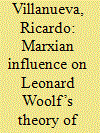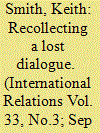|
|
|
Sort Order |
|
|
|
Items / Page
|
|
|
|
|
|
|
| Srl | Item |
| 1 |
ID:
168500


|
|
|
|
|
| Summary/Abstract |
The renaissance of classical realism in International Relations (IR) has highlighted the close historical and conceptual connection between realism and liberalism. In this essay, I consider an underexplored epistemological dimension of this connection using Karl Mannheim’s Ideology and Utopia – an influential work for classical IR realists and an important treatise on political theory in its own right. Based on Mannheim’s argument, I make the case that (a certain kind of) liberalism is the telos of (a certain kind of) realism: that the natural endpoint of the inherent logic of realism is a form of liberalism. I argue that completing the epistemological and political critique that leads to realism by also putting the realist position itself under (self-)examination, unearths a liberal outlook as its foundation. Explicating this dialectic adds a new dimension to the many other points of contact between realism and liberalism that have been explored by IR scholars in recent years, and it provides a new link between this scholarship and the literature on the epistemological foundations of classical realism. Finally, the essay is an argument for a closer engagement with Mannheim in an IR context, both as a philosopher of knowledge and as a political thinker.
|
|
|
|
|
|
|
|
|
|
|
|
|
|
|
|
| 2 |
ID:
168498


|
|
|
|
|
| Summary/Abstract |
In his own time, Leonard Woolf was one of the most prolific and respected experts on international affairs. Yet, his paramount place in the field fell rapidly, partly because he was a writer whose ideas have been labelled as utopian. This article employs Woolf to challenge the orthodox narrative of the discipline of International Relations (IR) that oversimplifies the early stages of the field as a dichotomy between idealism and realism. While this has already been done cogently by Peter Wilson, this article discloses a Marxist dimension in Woolf’s thought and writings. This is particularly important given that Marxism has regained significance in recent IR debates. Through a contextualist approach, this article demonstrates that Woolf represents a considerable challenge to conventional IR historiography and reveals the significance of Marxian-based understandings in the early stages of the discipline as an alternative to idealism and realism. In addition, this article shows some of the distinctiveness in Woolf’s Marxian writings on imperialism as an alternative to Leninist understandings.
|
|
|
|
|
|
|
|
|
|
|
|
|
|
|
|
| 3 |
ID:
168501


|
|
|
|
|
| Summary/Abstract |
Since its appellation, much work has sought to consolidate neoclassical realism. Specifically, a number of variations on the neoclassical theme have reconceptualised the third-image and carved out a distinctly European neoclassical variant. This article contributes by recollecting the Structural Realism of Logic of Anarchy. In unpacking Structural Realism’s framework and dissecting its engagement with inter alia Kenneth Waltz, this article illustrates the importance of Logic’s conceptualisation of the system, particularly in terms of anarchy’s logic. This framework can enrich a number of debates within the neoclassical realist community, especially concerning third-image change and the possibility of a neoclassical realism in and of Europe, while also contributing to debates regarding the strategic actor-ness of the European Union. While Logic and its framework might appear dated, the article submits that one of its principal motifs, anarchy, along with realism’s normative ethos may remind us of International Relation’s (IR’s) healthy pluralism.
|
|
|
|
|
|
|
|
|
|
|
|
|
|
|
|
| 4 |
ID:
168499


|
|
|
|
|
| Summary/Abstract |
This article deals with the concept of indirect coercion as a distinct type of coercive strategy involving three actors. We introduce a taxonomy of triangular strategies commonly employed in international politics: ‘hostage-taking’, ‘patron-client’ and ‘composite’ strategies. These three types of indirect coercion cover different ways in how the coercer draws the intermediary actor in the process of coercive bargaining to enhance his leverage over the target. For each type, we conduct a plausibility probe to study these dynamics on short empirical case studies. We argue that our conceptualisation of indirect coercion opens new avenues for research into deterrence and compellence in contemporary world politics.
|
|
|
|
|
|
|
|
|
|
|
|
|
|
|
|
| 5 |
ID:
168497


|
|
|
|
|
| Summary/Abstract |
This article uses the reflection on the direction (whither) and health (wither) of constructivism and the Association of Southeast Asian Nations (ASEAN) that was witnessed in 2017 to see what these deliberations reveal about the fixity of norms and their contestation. The argument presented is that constitutive norms create fixed parameters of shared understandings but that within those parameters the meaning and application of the norm can be contested and debated. This insight helps to bridge the gap between conventional and critical constructivists and shows that the premise of jettisoning the ASEAN Way as necessary for ASEAN to achieve its ambitious community-building project is flawed. The argument relies on insights from the constructivist literature on norm degeneration to show how contestation is not one part of a norm’s life cycle but rather a constant companion. However, norms are not just contested, but they have fixity, and here practice theory can help show that the social world is just as much about continuity as it is change. The ASEAN case study is timely as introspection about the efficacy of its constitutive norms – the ASEAN Way – was prominent in 2017 as ASEAN turned 50.
|
|
|
|
|
|
|
|
|
|
|
|
|
|
|
|
| 6 |
ID:
168496


|
|
|
|
|
| Summary/Abstract |
Taking wartime nurses – and post-war nursing – seriously makes one think more politically about the wounds endured in wartime and what counts as a wartime ‘wound’. Thinking about wounds and the wounded, in turn, reveals how war-waging officials, and militarizers more generally, have tried in the past, and today still try, to shrink citizens’ awareness of militarism’s negative consequences. Nursing, nurses, wounds, and the wounded each continues to be gendered, influencing the workings of both masculinities and femininities in past and current wartimes and post-war politics. Feminist analysts have expanded the ‘political’ and multiplied ‘political thinkers’. Failing to absorb these feminist theoretical insights fosters the trivialization of nurses and other caretakers of the wartime wounded and their diverse political thinking. It is a failing with serious implications. Overlooking nurses and others who provide wartime care, combined with a lack of curiosity about wounds, perpetuates militarization and war.
|
|
|
|
|
|
|
|
|
|
|
|
|
|
|
|
|
|
|
|
|